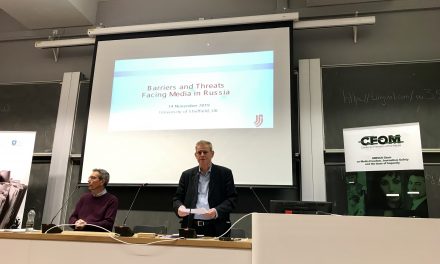William Horsley’s full text of statement on the discussion on Approval of UN Plan of Action on safety of journalists and the issue of impunity.
William Horsley: The Centre for Freedom of the Media at the University of Sheffield conducts research to promote adherence to the norms of international law in this area. Firstly,on the importance of international monitoring, a key part of the Action Plan: I wish to draw the attention of delegates to our Centre’s conclusion that serious and measurable damage is being done to the safety of the working environment for journalists on every continent by the very high levels of impunity that are revealed in the Director-General’s latest report: that is, damage in the form of deliberate killings, other violent attacks, arbitrary imprisonment and evidence of even higher levels of effective impunity, in more and more countries. That alarming trend must, I submit, be reversed as a matter of urgency and very high priority. The response rate from Member States and the figures related to judicial follow-ups have grown worse over each of the two-year periods covered by the Reports; in the latest period, covering 2008 and 2009, the Report shows that only 9 out of the 27 countries where journalists were killed have so far provided any information, and according to the latest figures the results of criminal investigatons related to the 77 killings that occurred in the single year of 2009 — the latest for which such figures are available — was astonishingly poor: the total number of convictions so far secured is only four. It is also disturbing for the international community to note that since then, in the years 2010 and 2011, the death toll of journalists killed in the course of their professional work has risen once again — to a total of 127 killings in as many as 37 countries. We believe that the IPDC Council has a vital role and responsibility to take steps to improve this record. I commend the proposals outlined by Mr Berger of UNESCO, which foresee the use in future of a template of questions that will provide more detailed information about the progress of investigations and judicial proceedings in each case; as well as adopting the practice of making the responses of states public in real time as and when they are received. That system would also help to alleviate any concerns on the part of member states that the precise details of their own responses ahd not been fully or accurately represented in the Director-general’s biennial reports.
Secondly, the careful assessment of the Centre for Freedom of the Media is that the broad-brush and inclusive approach of the Action Plan is well-judged and necessary to achieve the goals agreed by member states and al concerned. One crucial development identified in the Plan is the fact that in recent years the majority of journalists’ killings have taken place not in war zones as such, but in a growing number of territories and states where armed insurgencies are taking place, or as a result of the actions of armed criminal organisations or the breakdown of the rule of law. It is therefore right, we think, that the Action Plan invites the active involvement of member states, and also advances cooperation among all relevant UN agencies and bodies; and it also foresees implementing a coherent set of actions in the UN’s country programmes (as set out in point 5.3), through the field missions and the combined work of the Special Rapporteurs and the other staff under the UN High Commissioner for Human Rights. The plan also rightly identifies the need to give assistance to help bring national laws and practices into line with international norms and the obligations publicly entered into by member states (as set out in point 5.6)
The Plan also encourages member states to consider ways of extending the remit of UN Security Council Resolution 1738, which deals with attacks on journalists in conflict zones. The Centre for Freedom of the Media takes this occasion to comment that in reality Resolution 1738 has not yet been used in practice, throughout the five years since it was unanimously adopted, to attempt to enforce its own provisions, which rest on the recognition that deliberate attacks on journalists in conflict areas may constitute war crimes and may also be deemed to represent a threat to international peace and security. We suggest that this is something that warrants the urgent attention of the Security Council and indeed of the Office of the Secretary-general himself.
Finally, I want to say that delegates and member states should be properly aware of the special importance attached to the “positive obligations” of states, as set out by the UN Human Rights Committee, a most authoritative body, in its General Comment Number 34 last year. This is a significant new interpretation of the effect of states’ treaty commitments. It says in particular, in paragraph 23, that states should proactively “put in place effective measures to protect against attacks aimed at silencing those who are exercising their right to freedom of expression”. The Human Rights Committee also explicitly identifies the duty of states to ensure that effective and prompt investigations are carried out so that when journalists or others are killed, so that justice is not only done, but is seen to be done. In this connexion we also commend the Guidelines on Impunity adopted by the Committee of Ministers of the Council of Europe, which stress the absolute requirement that “effective investigations” of crimes must be carried out, and which also draws attention to the troubling fact that both in Europe and beyond many unpunished violent crimes against journalists, including killings, are found to have been perpetrated by state officials of employees.
All these things, we submit, demonstrate that it is inescapably necessary for all states to act responsibly and to make themselves accountable by providing full information in response to requests by the UNESCO Director-General; and give the highest priority to ensuring the safety of journalists and eradicating impunity, as called for in the UN Action Plan. Thank you.



